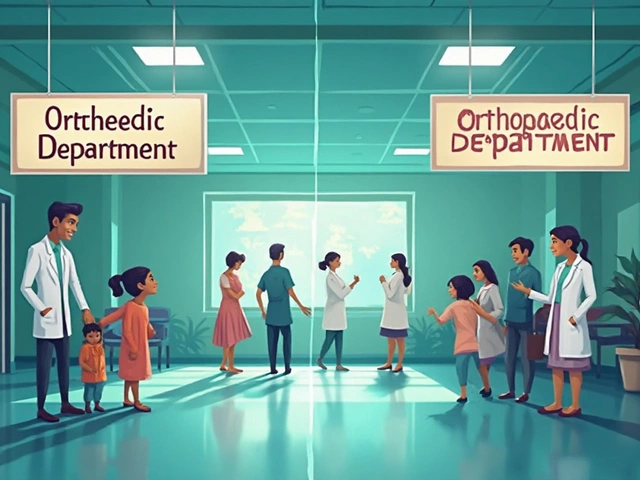- Home
- Mental Health
- Spotting Schizophrenia: 3 Key Warning Signs You Need to Know

Spotting Schizophrenia: 3 Key Warning Signs You Need to Know
If you're wondering about schizophrenia, you're not alone. This mental health disorder affects about 1% of people worldwide, but it's often shrouded in mystery and misunderstanding. So, what are some warning signs that someone might be struggling with it?
First off, it's super important to recognize the signals early on. Intervening sooner rather than later can make a big difference in management and treatment. We’re going to look at three major warning signs, so you can get a clearer picture of what might be going on if you're worried about someone you love, or even yourself.
Delusions are often the first stop on this road. Imagine believing something with all your heart, even if it defies reality. It might be centered on themes of persecution, grandeur, or even something mundane blown out of proportion.
- Understanding Schizophrenia
- The First Sign: Delusions
- The Second Sign: Hallucinations
- The Third Sign: Disorganized Thinking
- Seeking Professional Help and Support
Understanding Schizophrenia
Schizophrenia is a long-term mental health condition that affects how a person thinks, feels, and behaves. It's characterized by episodes of psychosis, where reality might seem skewed. Sounds intense, right? That’s why spotting the warning signs early can be a game-changer.
The tricky part is that schizophrenia often kicks in during late adolescence or early adulthood, around the ages of 16 to 30. The symptoms might pop up slowly over time, making it hard to recognize at first. But once you know what to look for, the puzzle becomes a bit clearer.
Commonly Affected Areas
Schizophrenia typically shakes up three main areas: cognition, emotions, and behavior. Here’s a quick rundown:
- Cognitive: It messes with memory, attention, and basically how someone processes their thoughts. Imagine trying to think clearly when everything's fuzzy.
- Emotional: People might seem flat or detached. It’s not that they don’t care; it's like their emotional responses are muted.
- Behavioral: Expect things like withdrawal from social activities, unusual behavior, or even confusion in daily routines.
The Biological Angle
Diving into the science bit, genetics and environment both play their roles. If it runs in the family, the chances of developing schizophrenia are higher. But it’s not just about genes—stressful environments or traumatic experiences can trigger symptoms, too.
The Big Picture
It’s key to understand that schizophrenia is not split personality or multiple personality disorder, as often misrepresented. It's a complex condition that requires understanding and support. Noticing the signs and reaching out for therapy can vastly improve quality of life for those affected.
Studies have shown that early intervention programs significantly help in managing schizophrenia. A mix of medication, counseling, and social support can make all the difference. Prioritizing mental health and staying informed can pave the way for better treatment outcomes.
The First Sign: Delusions
Alright, so let's dive into delusions, which are like the hallmark warning sign of schizophrenia. But what exactly are they? Well, delusions are these firm, false beliefs that just don't shake, no matter what evidence you throw at them. It's like trying to convince someone that the sky isn't green when they absolutely see it that way.
Different Types of Delusions
Delusions come in a variety of flavors, and here are the most common ones you might encounter:
- Persecutory Delusions: These are where someone might think others are out to get them. It could be anything from believing they're being spied on, to thinking their food is being tampered with.
- Grandiose Delusions: Here, a person feels they have amazing talents or have made important discoveries. Picture someone genuinely thinking they're best buddies with celebrities or that they've invented time travel.
- Referential Delusions: This involves believing that common elements of the environment are directly related to them. It might be thinking a popular TV show is sending them secret messages.
Why Delusions Matter
Delusions can really tilt someone's world view completely off balance. The impact is major and can influence how they interact with everyday life. Relationships, work, and even simple tasks can become huge challenges.
What Can Be Done?
If you notice these signs in someone, it's super important to encourage them to seek help from mental health professionals. Early intervention with therapy and medication can help manage symptoms and even improve quality of life. Don't wait for it to get worse; early support is key.
| Type of Delusion | Common Themes |
|---|---|
| Persecutory | Paranoia, fear of harm |
| Grandiose | Exaggerated self-worth |
| Referential | Personal messages from media |

The Second Sign: Hallucinations
When discussing schizophrenia, hallucinations are often the first thing that comes to mind. These aren't just dreams or over-active imaginations—hallucinations mean sensing things that aren’t actually there. It’s kind of like your brain’s playing tricks on you, and it can be both fascinating and terrifying.
Types of Hallucinations
There are different kinds, but auditory ones are the most common in schizophrenia. That means hearing voices, often separate from the person's thoughts. These voices might tell someone to do things or comment on what they're doing, and sometimes they’re downright hostile.
Visual hallucinations are another type, and although less common, they can range from seeing simple patterns or shapes to complex scenes and people. Then there are olfactory (smelling things that aren’t there), gustatory (tasting phantom flavors), and tactile hallucinations, which involve feeling things like skin sensations that aren’t happening.
How Hallucinations Affect Daily Life
Imagine trying to get through your day with a voice yammering in your ear or seeing something that makes no sense to anyone else. It's exhausting and can seriously interfere with concentration, mood, and behavior. This is why recognizing these hallucinations as part of a mental health issue, rather than reality, is crucial.
Data suggests that up to 70% of people with schizophrenia experience auditory hallucinations at some point, and recognizing them early can lead to more effective intervention.
Hallucinations are a hallmark sign, not just of schizophrenia, but of some other mental health conditions too. But with therapy and possibly medication, they can be managed, helping those affected lead much fulfilling lives.
The Third Sign: Disorganized Thinking
When it comes to identifying schizophrenia, disorganized thinking is a big red flag. This isn't just about being a little scattered or forgetful—it's a persistent pattern that seriously messes with the way someone communicates.
Have you ever chatted with someone and felt like their thoughts were jumping all over the map? Folks with this symptom might start a conversation on one topic, veer off without notice, and end up somewhere completely unrelated, all in the space of a few sentences.
How It Affects Communication
This can lead to what's called 'word salad', where sentences are technically words but don't make any logical sense together. It's like having all the right puzzle pieces, but no picture to guide you. For someone on the outside, it can be baffling to follow.
Impact on Daily Life
Now, this isn't just about awkward conversations. Disorganized thinking can affect daily living, making it tough to carry out tasks that require planning or following steps, like cooking a recipe or getting through the steps of a project at work.
Treatment and Coping Strategies
So what can be done? Treatment options generally include a mix of medication and therapy. Antipsychotic meds help to balance brain chemistry, which can make thinking clearer over time.
Supportive Approaches
Therapeutic support like cognitive behavioral therapy (CBT) is crucial. It helps by teaching skills to manage and structure thoughts better. Family support also plays a big role—knowing that they have someone to turn to can make a world of difference for those dealing with this aspect of schizophrenia.

Seeking Professional Help and Support
Noticing warning signs like delusions and hallucinations is crucial, but the next step is even more pivotal: getting the right help. If you're dealing with suspected schizophrenia, reaching out to a mental health professional can change the trajectory of someone's life. You might wonder, what's involved in this process?
Why Professional Help Matters
Going it alone is risky. Schizophrenia is a complex disorder, and while family and friends can offer great support, a mental health pro can provide the necessary tools and treatment, ensuring you're not fighting this battle empty-handed.
Steps to Take
- Look for a Specialist. Seek a psychiatrist or psychologist who specializes in mental health disorders. They can tailor a treatment plan that suits individual needs.
- Prepare for the First Visit. Note any symptoms, changes in behavior, or specific events that concern you. This info helps the professional provide better insight and guidance.
- Discuss Treatment Options. Medications like antipsychotics are often used to manage symptoms, and various therapies can also be beneficial, such as cognitive-behavioral therapy (CBT).
Supporting Someone Else
If a loved one is showing signs, be there for them. Encourage seeking help and provide a support system. Sometimes, the first step is just having a conversation and letting them know they're not alone.
Don't forget, timing can be crucial. Studies suggest that early intervention can significantly improve outcomes. Acting quickly gets those affected on the path to managing their condition more effectively.

Arnav Singh
I am a health expert with a focus on medicine-related topics in India. My work involves researching and writing articles that aim to inform and educate readers about health and wellness practices. I enjoy exploring the intersections of traditional and modern medicine and how they impact healthcare in the Indian context. Writing for various health magazines and platforms allows me to share my insights with a wider audience.
About
Medical Resource Center India is a comprehensive online platform dedicated to providing reliable health information and medical resources in India. Explore a wide range of articles, tips, and advice on medicine, healthcare services, and wellness. Stay informed about the latest developments in Indian medicine and access valuable insights into maintaining a healthy lifestyle. Discover expert guidance and health solutions tailored for every Indian citizen. Your go-to destination for authoritative medical knowledge in India.








